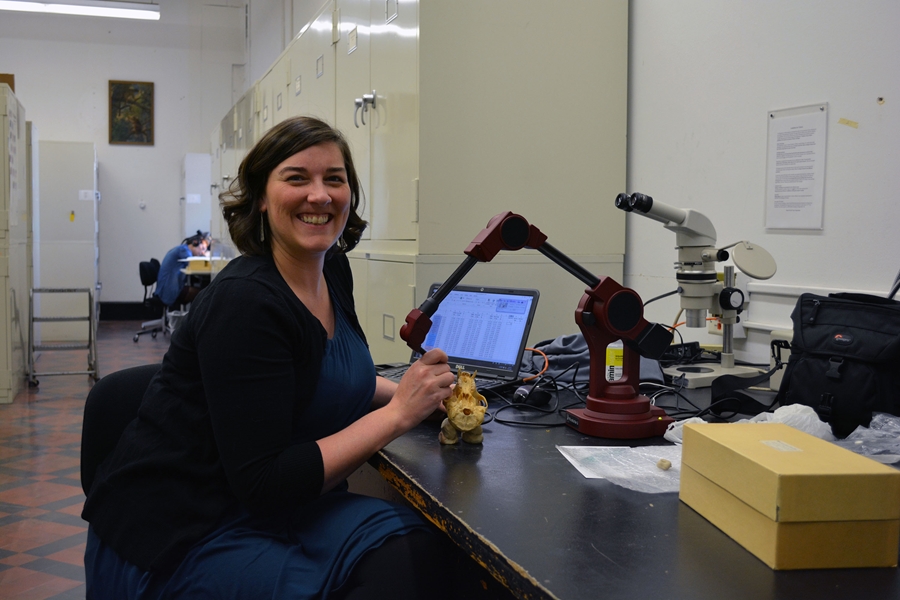
FAYETTEVILLE, Ark. – A biological anthropologist at the University of Arkansas and her colleagues at Johns Hopkins School of Medicine and Marquette University have received a $219,000 grant from the National Science Foundation to study skull and jaw anatomy in 16 closely related primate species, including humans.
The study will focus on how the teeth, jaw and related joints work together as a chewing system and how the components are affected by aging and abnormal changes.
.jpg) |
|
Allen’s swamp monkey (Allenopithecus nigroviridis), found in central Africa. |
“We’re trying to provide a more complete picture of the anatomical interrelationships of this complex system,” said Claire Terhune, assistant professor of anthropology in the J. William Fulbright College of Arts and Sciences. “We hope not only to address how the different components are correlated but also show how changes occur during the lifetime of an individual, and how primate species differ from one another in these changes. By changes, we mean both normal and pathological dental wear, as well as normal and abnormal, or arthritic, changes in the temporomandibular joint.”
The temporomandibular joint (or TMJ) connects the jaw to the temporal bones of the skull and sometimes develops pathologically in primates, resulting in an arthritic joint. But very little research has been done regarding which primate species experience these arthritic changes and how often this occurs. The research may help to explain these pathologies and inform clinical studies of dental problems in humans.
In addition to studying changes that occur at different ages, the researchers will compare the 16 closely related primate species and look for similarities in the degree of evolutionary change over time.
“Do two shapes or pathologies vary in relation to one another?” said Terhune. “Do you always see dental pathologies, such as tooth loss or abscesses, occurring with osteoarthritis in the temporomandibular joint? These are the kind of questions we’re asking.”
.jpg) |
|
Owl monkey, (Aotus trivirgatus), a very small, nocturnal monkey from central/south America. |
Data from the study will be made available to both anthropological and biomedical researchers.
In addition to travel for data collection, the grant will support a post-doctoral researcher at the University of Arkansas and involvement by undergraduate students.
Terhune’s colleagues are Siobhán Cooke at Johns Hopkins University and Claire Kirchhof at Marquette University.
About the University of Arkansas: The University of Arkansas provides an internationally competitive education for undergraduate and graduate students in more than 200 academic programs. The university contributes new knowledge, economic development, basic and applied research, and creative activity while also providing service to academic and professional disciplines. The Carnegie Foundation classifies the University of Arkansas among only 2 percent of universities in America that have the highest level of research activity. U.S. News & World Report ranks the University of Arkansas among its top American public research universities. Founded in 1871, the University of Arkansas comprises 10 colleges and schools and maintains a low student-to-faculty ratio that promotes personal attention and close mentoring.
Contacts
Claire Terhune, assistant professor, Anthropology
J. William Fulbright College of Arts and Sciences
479-575-3529, cterhune@uark.edu
Matt McGowan, science and research communications officer
University Relations
479-575-4246 , dmcgowa@uark.edu